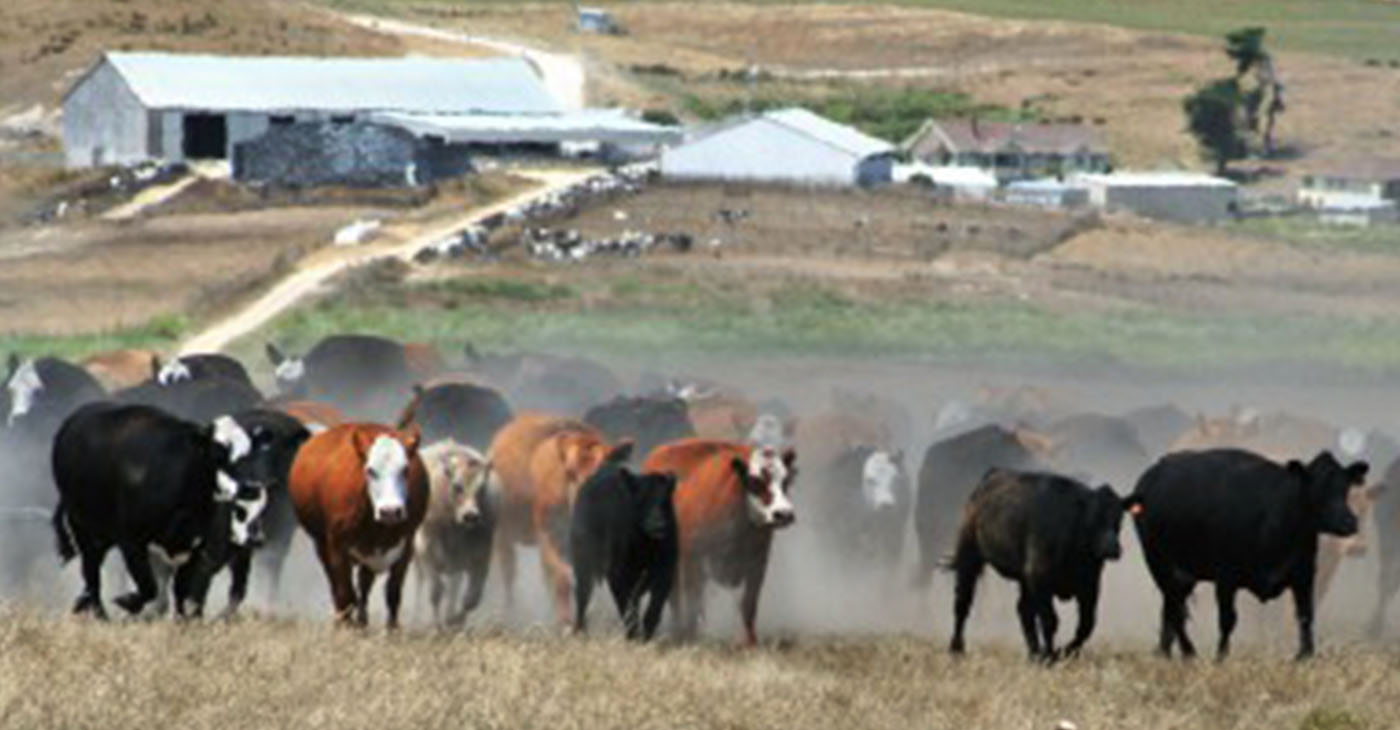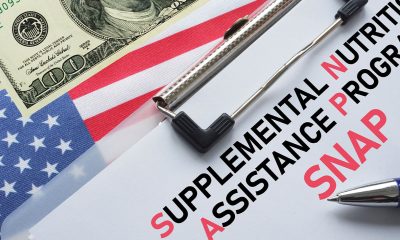Business
Emergency Federal Drought Relief Available
Farmers and ranchers interested in a disaster loan can apply on the USDA website. Small, non-farm businesses, small agricultural cooperatives, and most private nonprofits can apply for the loans by contacting the SBA at 1 (800) 659-2955 or by email. Hearing impaired individuals may call 1 (800) 877-8339.

Marin and all other California counties to be eligible for assistance
Courtesy of Marin County
As California and the West Coast enter their third year of drought, Marin County and the state’s other 57 counties have been declared primary disaster areas by the U.S. Department of Agriculture. The dry conditions are bad news for Marin’s farmers and ranchers, but the disaster designation status makes available emergency loans for agricultural businesses.
Additionally, the Small Business Administration (SBA) is offering Economic Injury Disaster Loans to non-farm small businesses that do business directly with farmers and ranchers, such as truckers and suppliers of agricultural equipment or services. Eligible businesses may apply for disaster loans through Dec. 8, 2022.
Farmers and ranchers interested in a disaster loan can apply on the USDA website. Small, non-farm businesses, small agricultural cooperatives, and most private nonprofits can apply for the loans by contacting the SBA at 1 (800) 659-2955 or by email. Hearing impaired individuals may call 1 (800) 877-8339.
“We want to raise awareness of the financial opportunities this drought designation provides because it may help some of these small businesses hampered by our continuing severe drought conditions,” said Marin County Agricultural Commissioner Stefan Parnay.
The federal commitment to assist businesses because of drought-related hardship extends to 23 other western states in addition to California. Small non-farm businesses, small agricultural cooperatives, and most private nonprofits of any size may qualify for SBA Economic Injury Disaster Loans to help meet financial obligations and operating expenses that could have been met had the drought not occurred.
In July 2021, the State of California added Marin to its list of counties falling under its state of emergency for drought and record-breaking high temperatures statewide. Governor Gavin Newsom made the drought official in 50 of the state’s 58 counties. Since then, state agencies partnered with local water suppliers to promote conservation tips through the Save Our Water campaign.
The Marin County Board of Supervisors voted unanimously May 18, 2021, to declare a local emergency and acknowledge the imminent threat of disaster and the severe effect on dairies and ranchers in West Marin. It also made the County eligible for California Disaster Assistance and other forms of state funding and resources. The local declaration cleared the way for state authorities to aid response and recovery efforts available to the County, water suppliers, farmers, impacted businesses and residents.
Marin Water, the municipal water district serving the majority of water customers in the county, and the Novato-based North Marin Water District (NMWD) are staying in contact with the County about drought conditions. Both water districts have declared water shortage emergencies and enacted mandatory conservation measures. Marin Water serves more than 191,000 customers in central and southern Marin. NWMD serves a customer base of about 64,000 in and around Novato and parts of coastal West Marin. For localized details, see the water rules webpages for Marin Water and NMWD.
Marin residents have been asked to support local agricultural producers who have been affected by the drought right on the heels of the COVID-19 pandemic. In 2021 numerous Marin ranchers had to import water by truck to keep their animals alive while also reducing their herds. With far less vegetation for grazing because of the ongoing drought, animals are eating imported feed shipped from other states at extremely high costs to the ranchers. Additionally, a few Marin crop producers had to import water by truck to keep crops alive and fallowed approximately 150 acres, or about 50% of the 300 crop acres in the county.
“As the region enters its third year of drought, this season is going to take a significant toll on our agricultural industry,” Parnay said.
The Board of Supervisors last year approved $150,000 in drought relief funds for the agricultural industry and another $250,000 for general drought relief needs to augment other state and federal aid.
Activism
OP-ED: AB 1349 Puts Corporate Power Over Community
Since Ticketmaster and Live Nation merged in 2010, ticket prices have jumped more than 150 percent. Activities that once fit a family’s budget now take significant disposable income that most working families simply don’t have. The problem is compounded by a system that has tilted access toward the wealthy and white-collar workers. If you have a fancy credit card, you get “presale access,” and if you work in an office instead of a warehouse, you might be able to wait in an online queue to buy a ticket. Access now means privilege.

By Bishop Joseph Simmons, Senior Pastor, Greater St. Paul Baptist Church, Oakland
As a pastor, I believe in the power that a sense of community can have on improving people’s lives. Live events are one of the few places where people from different backgrounds and ages can share the same space and experience – where construction workers sit next to lawyers at a concert, and teenagers enjoy a basketball game with their grandparents. Yet, over the past decade, I’ve witnessed these experiences – the concerts, games, and cultural events where we gather – become increasingly unaffordable, and it is a shame.
These moments of connection matter as they form part of the fabric that holds communities together. But that fabric is fraying because of Ticketmaster/Live Nation’s unchecked control over access to live events. Unfortunately, AB 1349 would only further entrench their corporate power over our spaces.
Since Ticketmaster and Live Nation merged in 2010, ticket prices have jumped more than 150 percent. Activities that once fit a family’s budget now take significant disposable income that most working families simply don’t have. The problem is compounded by a system that has tilted access toward the wealthy and white-collar workers. If you have a fancy credit card, you get “presale access,” and if you work in an office instead of a warehouse, you might be able to wait in an online queue to buy a ticket. Access now means privilege.
Power over live events is concentrated in a single corporate entity, and this regime operates without transparency or accountability – much like a dictator. Ticketmaster controls 80 percent of first-sale tickets and nearly a third of resale tickets, but they still want more. More power, more control for Ticketmaster means higher prices and less access for consumers. It’s the agenda they are pushing nationally, with the help of former Trump political operatives, who are quietly trying to undo the antitrust lawsuit launched against Ticketmaster/Live Nation under President Biden’s DOJ.
That’s why I’m deeply concerned about AB 1349 in its current form. Rather than reining in Ticketmaster’s power, the bill risks strengthening it, aligning with Trump. AB 1349 gives Ticketmaster the ability to control a consumer’s ticket forever by granting Ticketmaster’s regime new powers in state law to prevent consumers from reselling or giving away their tickets. It also creates new pathways for Ticketmaster to discriminate and retaliate against consumers who choose to shop around for the best service and fees on resale platforms that aren’t yet controlled by Ticketmaster. These provisions are anti-consumer and anti-democratic.
California has an opportunity to stand with consumers, to demand transparency, and to restore genuine competition in this industry. But that requires legislation developed with input from the community and faith leaders, not proposals backed by the very company causing the harm.
Will our laws reflect fairness, inclusion, and accountability? Or will we let corporate interests tighten their grip on spaces that should belong to everyone? I, for one, support the former and encourage the California Legislature to reject AB 1349 outright or amend it to remove any provisions that expand Ticketmaster’s control. I also urge community members to contact their representatives and advocate for accessible, inclusive live events for all Californians. Let’s work together to ensure these gathering spaces remain open and welcoming to everyone, regardless of income or background.
Activism
Oakland Post: Week of December 31, 2025 – January 6, 2026
The printed Weekly Edition of the Oakland Post: Week of – December 31, 2025 – January 6, 2026

To enlarge your view of this issue, use the slider, magnifying glass icon or full page icon in the lower right corner of the browser window.
Activism
Big God Ministry Gives Away Toys in Marin City
Pastor Hall also gave a message of encouragement to the crowd, thanking Jesus for the “best year of their lives.” He asked each of the children what they wanted to be when they grow up.

By Godfrey Lee
Big God Ministries, pastored by David Hall, gave toys to the children in Marin City on Monday, Dec. 15, on the lawn near the corner of Drake Avenue and Donahue Street.
Pastor Hall also gave a message of encouragement to the crowd, thanking Jesus for the “best year of their lives.” He asked each of the children what they wanted to be when they grew up.
Around 75 parents and children were there to receive the presents, which consisted mainly of Gideon Bibles, Cat in the Hat pillows, Barbie dolls, Tonka trucks, and Lego building sets.
A half dozen volunteers from the Big God Ministry, including Donnie Roary, helped to set up the tables for the toy giveaway. The worship music was sung by Ruby Friedman, Keri Carpenter, and Jake Monaghan, who also played the accordion.
Big God Ministries meets on Sundays at 10 a.m. at the Mill Valley Community Center, 180 Camino Alto, Mill Valley, CA Their phone number is (415) 797-2567.
-

 Activism4 weeks ago
Activism4 weeks agoDesmond Gumbs — Visionary Founder, Mentor, and Builder of Opportunity
-

 Activism4 weeks ago
Activism4 weeks agoFamilies Across the U.S. Are Facing an ‘Affordability Crisis,’ Says United Way Bay Area
-

 Alameda County4 weeks ago
Alameda County4 weeks agoOakland Council Expands Citywide Security Cameras Despite Major Opposition
-

 Alameda County4 weeks ago
Alameda County4 weeks agoBling It On: Holiday Lights Brighten Dark Nights All Around the Bay
-

 Activism4 weeks ago
Activism4 weeks agoBlack Arts Movement Business District Named New Cultural District in California
-

 Activism4 weeks ago
Activism4 weeks agoOakland Post: Week of December 17 – 23, 2025
-

 Activism4 weeks ago
Activism4 weeks agoLu Lu’s House is Not Just Toying Around with the Community
-

 Activism3 weeks ago
Activism3 weeks agoFirst 5 Alameda County Distributes Over $8 Million in First Wave of Critical Relief Funds for Historically Underpaid Caregivers

















































